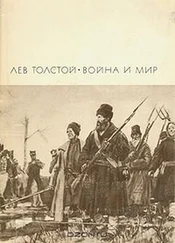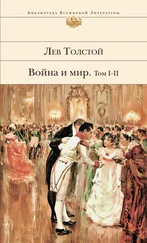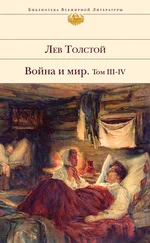| Quarante mille hommes massacres et l'armee de nos allies detruite, et vous trouvez la le mot pour rire," * he said, as if strengthening his views by this French sentence. "C'est bien pour un garcon de rien comme cet individu dont vous avez fait un ami, mais pas pour vous, pas pour vous. *(2) Only a hobbledehoy could amuse himself in this way," he added in Russian-but pronouncing the word with a French accent-having noticed that Zherkov could still hear him. * "Forty thousand men massacred and the army of our allies destroyed, and you find that a cause for jesting!" |
Quarante milles hommes massacr?s et l'ario m?e de nos alli?s d?truite, et vous trouvez l? le mot pour rire, - сказал он, как будто этою французскою фразой закрепляя свое мнение. - C'est bien pour un gar?on de rien, comme cet individu, dont vous avez fait un ami, mais pas pour vous, pas pour vous. [Сорок тысяч человек погибло и союзная нам армия уничтожена, а вы можете при этом шутить. |
| * (2) "It is all very well for that good-for-nothing fellow of whom you have made a friend, but not for you, not for you." |
Это простительно ничтожному мальчишке, как вот этот господин, которого вы сделали себе другом, но не вам, не вам.] Мальчишкам только можно так забавляться, - сказал князь Андрей по-русски, выговаривая это слово с французским акцентом, заметив, что Жерков мог еще слышать его. |
| He waited a moment to see whether the cornet would answer, but he turned and went out of the corridor. |
Он подождал, не ответит ли что корнет. Но корнет повернулся и вышел из коридора. |
| CHAPTER IV |
IV |
| The Pavlograd Hussars were stationed two miles from Braunau. |
Гусарский Павлоградский полк стоял в двух милях от Браунау. |
| The squadron in which Nicholas Rostov served as a cadet was quartered in the German village of Salzeneck. |
Эскадрон, в котором юнкером служил Николай Ростов, расположен был в немецкой деревне Зальценек. |
| The best quarters in the village were assigned to cavalry-captain Denisov, the squadron commander, known throughout the whole cavalry division as Vaska Denisov. |
Эскадронному командиру, ротмистру Денисову, известному всей кавалерийской дивизии под именем Васьки Денисова, была отведена лучшая квартира в деревне. |
| Cadet Rostov, ever since he had overtaken the regiment in Poland, had lived with the squadron commander. |
Юнкер Ростов с тех самых пор, как он догнал полк в Польше, жил вместе с эскадронным командиром. |
| On October 11, the day when all was astir at headquarters over the news of Mack's defeat, the camp life of the officers of this squadron was proceeding as usual. |
11 октября, в тот самый день, когда в главной квартире всё было поднято на ноги известием о поражении Мака, в штабе эскадрона походная жизнь спокойно шла по-старому. |
| Denisov, who had been losing at cards all night, had not yet come home when Rostov rode back early in the morning from a foraging expedition. |
Денисов, проигравший всю ночь в карты, еще не приходил домой, когда Ростов, рано утром, верхом, вернулся с фуражировки. |
| Rostov in his cadet uniform, with a jerk to his horse, rode up to the porch, swung his leg over the saddle with a supple youthful movement, stood for a moment in the stirrup as if loathe to part from his horse, and at last sprang down and called to his orderly. |
Ростов в юнкерском мундире подъехал к крыльцу, толконув лошадь, гибким, молодым жестом скинул ногу, постоял на стремени, как будто не желая расстаться с лошадью, наконец, спрыгнул и крикнул вестового. |
| "Ah, Bondarenko, dear friend!" said he to the hussar who rushed up headlong to the horse. "Walk him up and down, my dear fellow," he continued, with that gay brotherly cordiality which goodhearted young people show to everyone when they are happy. |
- А, Бондаренко, друг сердечный, - проговорил он бросившемуся стремглав к его лошади гусару. -Выводи, дружок, - сказал он с тою братскою, веселою нежностию, с которою обращаются со всеми хорошие молодые люди, когда они счастливы. |
| "Yes, your excellency," answered the Ukrainian gaily, tossing his head. |
- Слушаю, ваше сиятельство, - отвечал хохол, встряхивая весело головой. |
| "Mind, walk him up and down well!" |
- Смотри же, выводи хорошенько! |
| Another hussar also rushed toward the horse, but Bondarenko had already thrown the reins of the snaffle bridle over the horse's head. |
Другой гусар бросился тоже к лошади, но Бондаренко уже перекинул поводья трензеля. |
| It was evident that the cadet was liberal with his tips and that it paid to serve him. |
Видно было, что юнкер давал хорошо на водку, и что услужить ему было выгодно. |
| Rostov patted the horse's neck and then his flank, and lingered for a moment. |
Ростов погладил лошадь по шее, потом по крупу и остановился на крыльце. |
| "Splendid! |
"Славно! |
| What a horse he will be!" he thought with a smile, and holding up his saber, his spurs jingling, he ran up the steps of the porch. |
Такая будет лошадь!" сказал он сам себе и, улыбаясь и придерживая саблю, взбежал на крыльцо, погромыхивая шпорами. |
| His landlord, who in a waistcoat and a pointed cap, pitchfork in hand, was clearing manure from the cowhouse, looked out, and his face immediately brightened on seeing Rostov. |
Хозяин-немец, в фуфайке и колпаке, с вилами, которыми он вычищал навоз, выглянул из коровника. Лицо немца вдруг просветлело, как только он увидал Ростова. Он весело улыбнулся и подмигнул: |
| "Schon gut Morgen! |
"Sch?n, gut Morgen! |
| Schon gut Morgen!" * he said winking with a merry smile, evidently pleased to greet the young man. * "A very good morning! A very good morning!" |
Sch?n, gut Morgen!" [Прекрасно, доброго утра!] повторял он, видимо, находя удовольствие в приветствии молодого человека. |
| "Schon fleissig?" * said Rostov with the same gay brotherly smile which did not leave his eager face. "Hoch Oestreicher! |
- Schon fleissig! [Уже за работой!] - сказал Ростов всё с тою же радостною, братскою улыбкой, какая не сходила с его оживленного лица. - Hoch Oestreicher! |
| Hoch Russen! |
Hoch Russen! |
| Kaiser Alexander hoch!" *(2) said he, quoting words often repeated by the German landlord. * "Busy already?" * (2) "Hurrah for the Austrians! |
Kaiser Alexander hoch! [Ура Австрийцы! |
| Hurrah for the Russians! |
Ура Русские! |
| Hurrah for Emperor Alexander!" The German laughed, came out of the cowshed, pulled off his cap, and waving it above his head cried: |
Император Александр ура!] - обратился он к немцу, повторяя слова, говоренные часто немцем-хозяином. |
| "Und die ganze Welt hoch!" * |
Немец засмеялся, вышел совсем из двери коровника, сдернул колпак и, взмахнув им над головой,закричал: |
| * "And hurrah for the whole world!" |
- Und die ganze Welt hoch! [И весь свет ура!] |



